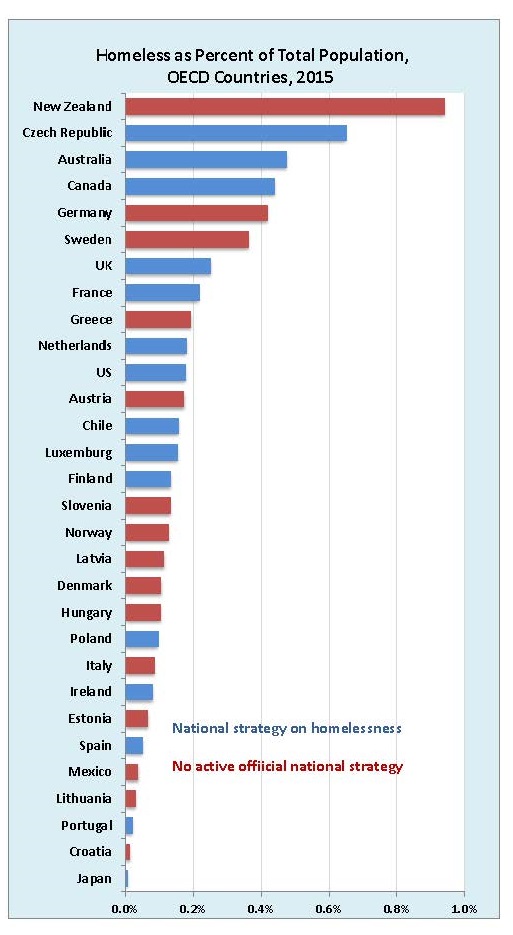Let’s face it. The homeless are ‘survivors’ who don’t pull their weight as members of the community. They live ‘off the land’ – but the land they use to live off is us, and they don’t give anything back in return. Except for the garbage they leave behind…
Hence we have a problem.
Which we might choose to ignore. Or to solve.
I’ll presume we want to solve it.
First step to solving any problem is, of course, to understand its nature.
So, what is bothering us?
The garbage they leave behind?
The sore sight they offer each time we see them?
The danger they represent for public safety?
The fact that they occupy public property? And prevent the rest of us from using it?
The fact that they don’t contribute?
The loss of their creative potential?
The bad example for our children?
They are a reminder of what could have happened to any of us?
Second step, the ‘how’ of the matter.
What caused such a number of able bodied people to live in the streets?
Why do so many of them use drugs? And alcohol?
Why do so many of them refuse to be helped? By the institutions which care for them?
I don’t have a real answers for any of these.
The first category of questions depends on each of us while the second on each of the homeless.
Nevertheless, I would like to point out a few things.
Very few of the homeless have been born on the street.
Most of them have been educated into the values of the society to which each of them belongs. Very few are recently arrived immigrants, at least in the US.
“we found that the longer that immigrants had lived in the United States, the greater their risk for homelessness. This is a unique finding that has not been reported before and suggests that immigrants are more likely to shed previous practices and attitudes from their origin countries over time as they live in the United States, which can put them at increased susceptibility to mental illness, substance abuse, and other factors that can increase homeless risk.This idea would be consistent with the literature finding that the health immigrant effect declines for immigrants in the United States as they acculturate and develop habits and practices similar to native residents”. J. Tsai, X.Gu, Homelessness among immigrants in the US
Why do I bother? Specially if I don’t have any answer?
The way I see it, each society is a social organism.

This image had been labeled ‘misleading’ by the Reddit users who cared enough about the subject. And rightly so. “This data is incredibly unreliable. It spans from 2009 to 2015 in different countries and has different criteria for defining homelessness.”
More about how this kind of data is been gathered and why it becomes misleading can be found in the OECD report on the subject. Click here for the 2019 one.
And what might we learn from this? Leaving aside the ‘vagaries’?
That New Zealand has way more homeless people than Japan?
And why nobody knows anything about the New Zealand homeless – or about those in the Czech Republic, but all concerned netizens are horrified by the manner in which the US are treating their homeless?

For starters, and given the relative size of the US population, there are way more homeless in the US than in the rest of the OECD. Roughly counting, of course.
Secondly, the US is the wealthiest country in the world. And the one which used to describe itself as being the place where all dreams could be fulfilled.
Then, and this is only a hunch, there is the ‘small’ problem of the ‘native citizens’. Oops… not a mere hunch anymore. “In 2013, 12,754 Māori were homeless, comprising 32% of the homeless population compared to comprising just 14.9% of the total population” Same considerations may be taken into account when evaluating the situation in Australia and Canada while Europe has a rather consistent Roma population. Many of whom continue to live in a ‘traditional’ manner.
So, after all, is there anything to be learned here?
Actually, yes.
That luck does play a huge role. It makes a hell of a difference being born a Maori in New Zealand or a billionaire’s child in California.
And that becoming acculturated in the US actually increases your chances of becoming homeless.
What?!?
Have you already forgotten? 😦
““we found that the longer that immigrants had lived in the United States, the greater their risk for homelessness. This is a unique finding that has not been reported before and suggests that immigrants are more likely to shed previous practices and attitudes from their origin countries over time as they live in the United States, which can put them at increased susceptibility to mental illness, substance abuse, and other factors that can increase homeless risk.This idea would be consistent with the literature finding that the health immigrant effect declines for immigrants in the United States as they acculturate and develop habits and practices similar to native residents”.” J. Tsai, X.Gu, Homelessness among immigrants in the US
The way I understand all this is that there must be a link between homelessness and the intensity, and character, of the social interaction prevalent among the members of any given society.
People in the West, and specially in the US, see personal success as paramount. And personal failure as … well… something to be shunned. Simply because it reminds us of what may happen to any of us.
Specially when taking on the risks we must assume if we want to really succeed. As we are pressured from early childhood.
The risks the immigrants grow accustomed to the longer they live in the US.
I’m afraid I was that close of forgetting a point I planned to make.
Why so many of the homeless use drugs and have an alcohol problem.
